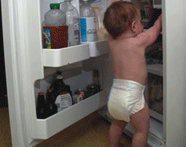Expanding Your Child’s Diet

After four to six months a baby becomes ready for solid foods. Your baby is not physically ready to handle solids earlier than this. Introducing solids before this time will interfere with the much needed iron absorbed from breastmilk or formula that they need for ideal growth.
Solids will not help your baby sleep through the night, so don’t rush the introduction of solid food, you will know when your baby is ready. Look for these signs before you introduce solids: starting to reach purposefully; grabs at bottle when drinking; strokes breast when breastfeeding; holds his head up and turns sideways; accepts food from a spoon.
Encourage your baby to take food from a spoon, feed himself with his fingers and drink from a cup. These are important skills to learn in the first year. Never add solids to a bottle.
Try one vegetable at a time. Offer it early in the day so you can watch and see if baby is allergic to that vegetable. Offer vegetables separately at first. Let baby learn the taste of each vegetable and get used to them before you mix them.
Wait 3 to 5 days before trying a new vegetable.
Watch your baby. Your baby will let you know when he is hungry or when he is full. Never leave a baby unattended while feeding. Remember to have fun and always introduce new foods in a relaxed environment.
Speak to your pediatrician about introducing solids to your baby’s diet, a baby’s need for food varies according to age, activity and growth rate.
Remember that milk is still the major food in your baby’s diet. Solids are introduced to add bulk to a baby’s diet, and to introduce textures, tastes and aromas to your growing baby.



